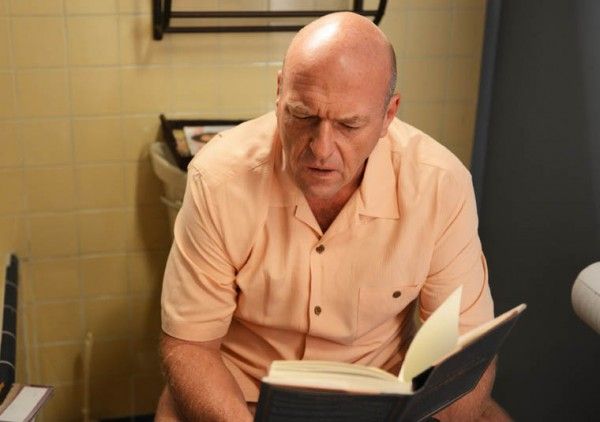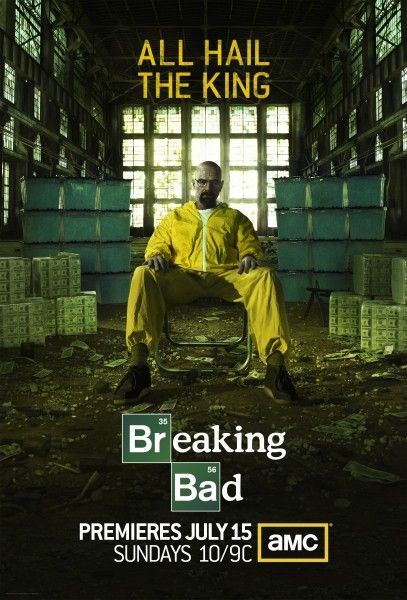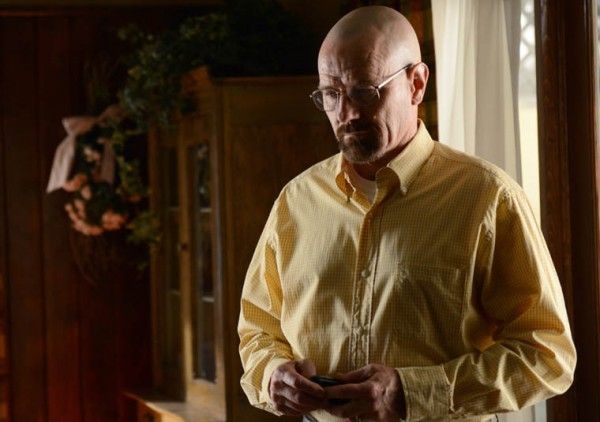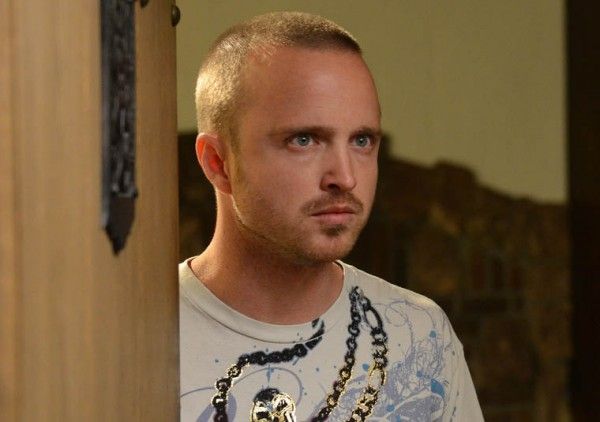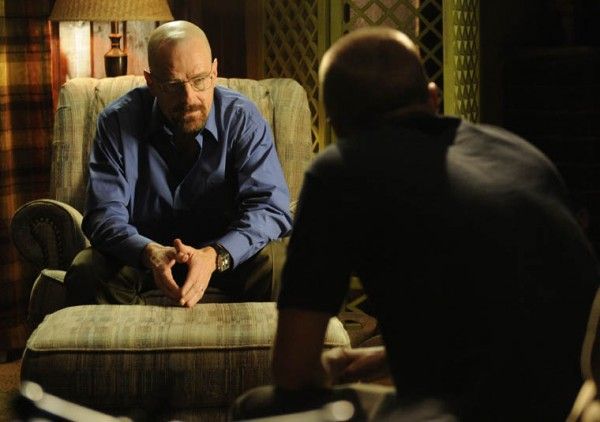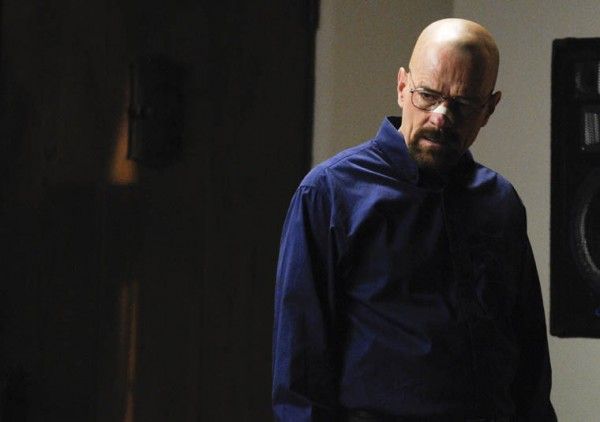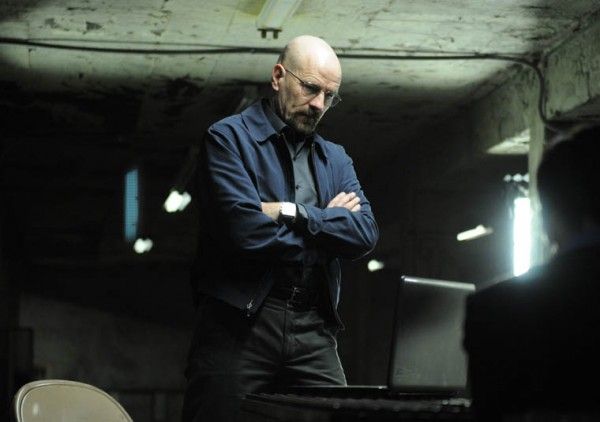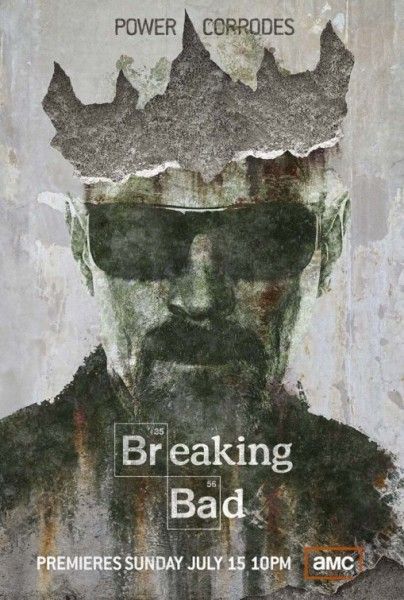With just a handful of episodes left of the highly acclaimed AMC drama series Breaking Bad, premiering this summer, the Academy of Television hosted an evening to celebrate the show while giving a glimpse into what fans can expect as the story about everyone’s favorite meth dealer continues. Collider was there to cover and attend the event, and we’ve compiled the highlights of what was said during the Q&A.
During the discussion, actor Bryan Cranston talked about how he didn’t quite grasp the extent of the darkness of his character’s journey when he signed on, how much he’s enjoyed the ride, that he got the “Br Ba” elemental chart tattooed on the inside of the ring finger of his right hand to commemorate the end of the series, which scene has resonated the most for him, how much the show has changed his life and career, and just how satisfying the finale will be for fans. Show creator Vince Gilligan talked about how they decided 62 episodes was enough to tell their story, the temptation of wanting to do another season, how the show ended up on AMC, that the show was originally set in the Inland Empire, their strive for authenticity, how they do the time lapse shots, that he never looks online to see what people are saying, and whether the spin-off featuring Saul (Bob Odenkirk) might actually happen. Check out what they had to say after the jump.
Vince, when you first started thinking about this show, did you have any clue what the lifespan of the program would be?
VINCE GILLIGAN: I didn’t know. Honest to god, I didn’t think there would be a program. Scientists say that there’s no way, on paper, that bumble bees should be able to fly ‘cause of the size of their wings in comparison to their body mass. If you look on paper, a middle-aged guy finds out, in the first 15 minutes, that he’s dying of cancer and he decides to cook crystal meth, who the fuck knew that this thing would last.
But, didn’t you have some sense of the arc of the show, beyond just taking Walter White from Mr. Chips to Scarface? How much had you charted out, after you started to think about the show?
GILLIGAN: Not as much as one might think. I had six wonderful writers. We did not know where we were going, for the longest time. In the early going, I thought maybe we’d have three seasons, in all honesty. When it looked like we could last longer than that – and thank goodness for the fans and the critics and the folks that kept us on the air, all those years – we eventually came to the recognition that 62 episodes, which is what we’re going to end with, was about perfect, but we did not know how it was going to end. Not at all.
When did you know that what happened in the last scene of that last episode would be the way that things would go down? Was the Walt Whitman book something you’d planned, long in advance?
GILLIGAN: It was about 10 or 12 episodes before that. It was probably about mid-way through Season 4 that we started talking about, “Wouldn’t it be cool if Hank Schrader (Dean Norris), this wonderful, smart DEA agent who has doggedly been after this guy that turns out to be his brother-in-law, little does he know, would, after all the hard work that goes into such an investigation, literally be sitting on the toilet when he notices this book given to Walt, that Walt probably should have not kept in the house.”
Which idea came first, the book or the shitter?
GILLIGAN: Book first, and then the toilet.
Do you ever think about what the legacy of this show it going to be?
GILLIGAN: I’d be disingenuous, if I said I didn’t. I watch a lot of old TV shows. I watch a lot of Twilight Zone. That was on the air in 1959 and people are still watching it. Anyone who makes TV and anyone who makes movies hopes that their work outlives them. That would be my hope. I make no prognostication about whether or not that will be the case, but I’d like to believe that it would be.
How did this show end up on AMC? Did you pitch it to all the networks?
GILLIGAN: The short answer is that AMC said yes and everyone else said no, and god bless them for it. It’s not an unusual story that you pitch a show or a movie and everyone says no except for the only one that says yes, and that’s the only one that counts. We did, indeed, pitch the pilot for Breaking Bad, all over town, and a lot of folks were actually very open to it, but also felt like, “This is a bit dangerous. It’s a bit risky.” There’s always a reason to say no. It’s easy to say no. No one gets fired for saying no. They only get fired for saying yes, which is one of the sad things about the business, both with movies and television. But AMC, luckily, said yes. One of my agents took it upon himself to send the script to the AMC network, and then he called me up and said, “Hey, I sent this thing to AMC. Everyone else has said no, so I figured, what the hell? Do you know them?” And I said, “Yeah, they show Short Circuit 3, 14 times a night.” That was before Mad Men, although I found out later that that was in the works, at that point. I said, “Why don’t you just send it to the Food Network, since it’s a show about cooking.” But, when you pull the lever of the slot machine, it comes up cherries, and that’s what happened. It was perfect timing. They were in the market to create scripted programming. They had nothing to lose. They weren’t as risk-adverse, perhaps. When you’re young and hungry or up-and-coming, it’s easier to be risk-adverse, and thank goodness that they wanted to do it.
Bryan, when this show began, could you ever have imagined how dark and twisted this road would get for Walter White?
BRYAN CRANSTON: Well, he gave me that broad stroke of Mr. Chips to Scarface at our first meeting and I thought, “How Scarfacian would that be? Would it be a whitewashed Scarface? Would it be toned down a little bit?” I didn’t know. He’s such a fine Southern gentleman. When you talk to him, he’s engaging and polite and sweet and smart. I just didn’t grasp the intensity or the darkness that lurks beneath. It’s amazing to all of us, who have worked with him so closely, to then discover, as we’re reading the script and going, “Oh, my god!,” and he’s going, “Yeah, I think it’s cool!” But I did know, when we first met, that what he was attempting to do had never been done before, in the history of television. He started a character out one way, as you get to know him a certain way, and then completely changed that character into someone else. To do that successfully was the gamble. We didn’t know if it was going to work.
How do you feel about viewers who still have a lot of sympathy for your character, even though he has become a monster, in many ways?
CRANSTON: I’ve enjoyed the ride. What Vince and his writing team have been able to do is not only instill dramatic elements in the story structure, but also within the audience. The audience, when they were introduced to my character, was painted that way. He brilliantly laid those markers in there. He set the hook and you fell for this guy. This guy is a good guy who’s trying to do the right thing. He’s got a limited amount of time, so he makes this rash decision. We’ve all made rash decisions before, but perhaps not how this has manifested. So, you’re with him. And then, you’re tested. The audience was tested at certain points of the storytelling, over the six years, and there’s going to be a turn, but that turn is so subjective. Some people say that turn happened in Season 2. Some people say it happened when they let Jane (Krysten Ritter) die. Some people will say it happened when they let something else happen. Personally, I feel it happened in the very first episode, when he attempted to become someone he wasn’t. Once you do that, it a slippery slope. He lost his soul, and he allowed it to just drift away. He’s in trouble.
Who’s Walt’s greatest threat now? After having disposed of so many of his enemies, is it Hank?
CRANSTON: It’s going to be a wonderful surprise, these last eight episodes, for how it’s resolved. I can only say that I think, personally and honestly, it’s going to be very satisfying for the fans. When I read the finale, I thought, “Oh, yeah! Yep!”
Vince, the idea that you would choose to end a show when it’s so critically successful and such a big hit with its fans seems crazy. Was there a temptation to continue the show for more seasons?
GILLIGAN: There was a temptation. There was a great lack of clarity, on my part, about how long this story should go and for how many seasons, and it was a very hard question to answer. I feel blessed that we had clarity and that we had the knowledge. The last thing in the world that I would want to know, in my own life, is when I’m going to pass away. One of the best blessings of this show was knowing, some time around the end of Season 4, exactly how many more episodes we were going to have, which was 16 more episodes. And then, the writers and I went back to the writers room and put up this big cork board that we divided into 16 equal sections and figured out exactly how much story we had left. You want to parcel it out, so that you end with having tied up the very last loose end and finish the last bit of plot that you hoped to achieve. You want to leave everything on the field. You don’t want to leave anything lacking, but you don’t want to finish up your story too soon. You want to time it out just right. There’s no way you can do that on a typical TV show because TV, by its very nature, is designed to be indefinite and go on forever. It was a wonderful thing that they allowed us to do. It was very sad. I’m sad right now. We wrapped up a week ago, Wednesday. That was our last day, and it was very moving. We were on location, and not on our soundstage. It was very sad and bittersweet, but I’m very thankful to be able to say that, at no time in the last few months, did I say, “Whoops, we made a mistake. We should have gone another year.” As sad as I am for this wonderful family to, in some sense, dissolve and go to the four winds, although hopefully we’ll always be in touch and always be friends and work together again, and this family is in the process of dissolution, as we speak, all things must come to an end. I’m really proud of these last eight episodes. I’ve been so worried, for so many months, that we were going to screw it up. It’s for you to decide, when you see it when it airs, but I think my writers and the actors would agree that we left it all on the field.
How did you mark the end of the show?
GILLIGAN: We had champagne that was chilled.
CRANSTON: Anytime in the last episode, when characters were finished with their work for that episode, we’d have a goodbye and more champagne. That’s why it ended so well. So, on the very last day, a lot of crew members were saying, “I’m going to get a tattoo.” They were going to get something that said, “Br Ba,” and so many of the crew members said they were going to do it. So, our medic on the show said that he was going to arrange it. It just so happened that a very talented tattoo artist in our art department, Richard, was going to be there and set up shop and give tattoos out. It was a very Breaking Bad thing. So I went, “I’m going to do that. I’m going to get a tattoo.” In my particular age group, we don’t get tattoos. When I was a kid, anybody that had a tattoo was either in the Hell’s Angels or in the Navy. So, I decided that I was going to do it, and I had to figure out where to put it. It’s the little Br Ba elemental chart, on the inside of my ring finger, on my right hand.
Vince, this show wasn’t originally set in New Mexico, right?
GILLIGAN: The original script, as I wrote it, took place in the Inland Empire. I was, and still am, friends with a DEA agent, who I’ve known for years. At that point, he was at the Riverside district office, so I thought I’d set it there, as a shout-out to him. And then, as luck would have it, Sony said, “What about New Mexico?” And I said, “What about it?” They said, “Well, a 30% rebate.” And you know what? It was one of the best things that happened to the show, other than hiring the wonderful cast. Albuquerque, New Mexico is a wonderful place to shoot, as is Southern California. No offense to the business here, but it was perfect for Breaking Bad.
CRANSTON: It was a happy accident for us to go to New Mexico, but it became a part of the fabric of the storytelling process. It was a character, in and of itself, and it legitimized the endeavor that Walt and Jesse (Aaron Paul) were in.
How careful have you had to be with showing how meth is made?
GILLIGAN: We strive for authenticity, in every way that we can, whether it’s the oncologist dealing with Walt’s cancer or the DEA. The DEA has been very helpful to us, as far as helping us strive for authenticity. As far as the meth goes, we hold that to the same standard. You could cook meth with that equipment. It’s basically a brewing process, except more complicated.
CRANSTON: Whenever we showed it, we never showed it in sequence. We always left a step out, or did it out of order.
GILLIGAN: That was in the early days. It’s a complex process. The truth of it is that we live in a post-Google world where you can find six recipes for meth in 30 seconds on a search engine.
Vince, did you plan the transitional landscape shots and the time lapse stuff, or was that born out of necessity?
GILLIGAN: That time lapse stuff was never something I was thinking of, when I was writing the pilot. What’s so great about making television is that it’s a collaborative beast. It’s created by a great many hands belonging to a great many people. It was somebody’s idea, at some point, to do that. The technology now, with the digital SLRs, is such that pretty much every time lapse you’ve ever seen on the show was shot with a Canon 5D Mark II or a 7D, or a Nikon D8, which are something you could get at Best Buy.
CRANSTON: We had a crew that would come out periodically and set up for the angle they would want, and they’d stay all night, shooting it.
GILLIGAN: You can shoot those on your own. They’re a lot of fun to shoot. It’s actually really satisfying to shoot a time lapse. And it became a visual motif. Other shows do it, as well. It’s a fun way to evoke the passage of time.
Bryan, what was your favorite scene that you acted in and just thought was awesome?
CRANSTON: It’s in the very last season coming up, when I take over a small country. That was monumental. No. I keep going back to something that became a very personal thing for me. The scene when I watch Jane die resonated with me tremendously, as a father, having that type of moral struggle. He really was struggling with what he should do and what the best move was, and vacillating with the error of omission is what finally took him.
Do you ever look online to see what people are saying about the show?
GILLIGAN: I have to say that I never go on the internet for anything but porn. I literally have never Googled myself.
CRANSTON: It’s fun!
GILLIGAN: It’s not because I’m jaded or that I have an ego. It’s quite the opposite. It’s an understanding of how neurotic I am. I know there could be 100,000 good posts, and all that I’ll remember is the one bad one, so what the hell is the point?
CRANSTON: There’s more than one, actually.
GILLIGAN: So, it’s not out of some moral purity, on my part. It’s just understanding how weak I truly am. I’ve imparted that philosophy to the writers, but some of them look stuff up while some don’t. Same with the editors, directors and actors. To each their own. It wouldn’t make me feel good, so I don’t do it. I do hear things, anecdotally through the grapevine, in general, about how things are playing. We just try to bulletproof the story, as well as we can. The writers are the first audience for it, and we beat our heads against the wall until it makes sense to us and until we come up with something that we like. We make sure, as much as humanly possible, that we can dot all the I’s and cross all the T’s, and tie up all the loose ends. We’re a tough audience, the seven of us, because we’ve watched a lot of TV, we’ve watched a lot of movies and we’ve read a lot of books, and we can smell BS, a mile away. We’re trying to shovel it ourselves, so we try to shovel as little of it as possible.
Bryan, what’s it like to work in so many different mediums and genres now?
CRANSTON: Any performer would love to have the opportunity to be able to express themselves in many different areas. If you feel confident in those areas, you would hope to have the opportunity to do them, whether it’s drama, comedy, musical, or whatever your interests are. I should say, and unabashedly so, that all these good things are happening for my career, right now, because of this show. This show changed my life, both professionally and personally, and I am forever grateful to [Vince] for that.
Vince, there’s been talk about a possible spin-off featuring Saul (Bob Odenkirk). How real is that, and have you written anything yet?
GILLIGAN: I would very much like to see that happen. We are talking about it. Nothing is set in stone yet, but I can tell you, for sure, that I would love to see that happen.
CRANSTON: Are we all in it?!
Breaking Bad returns for its final episodes this summer on AMC.

